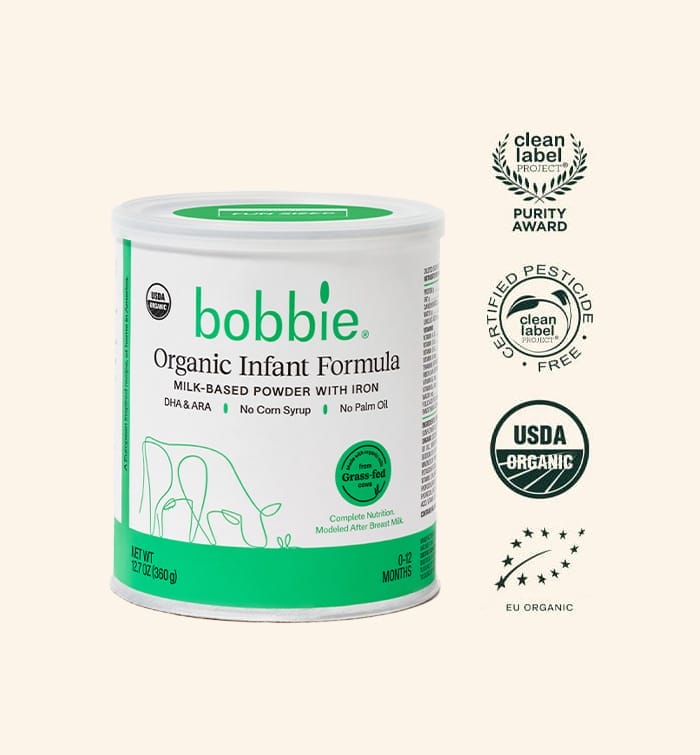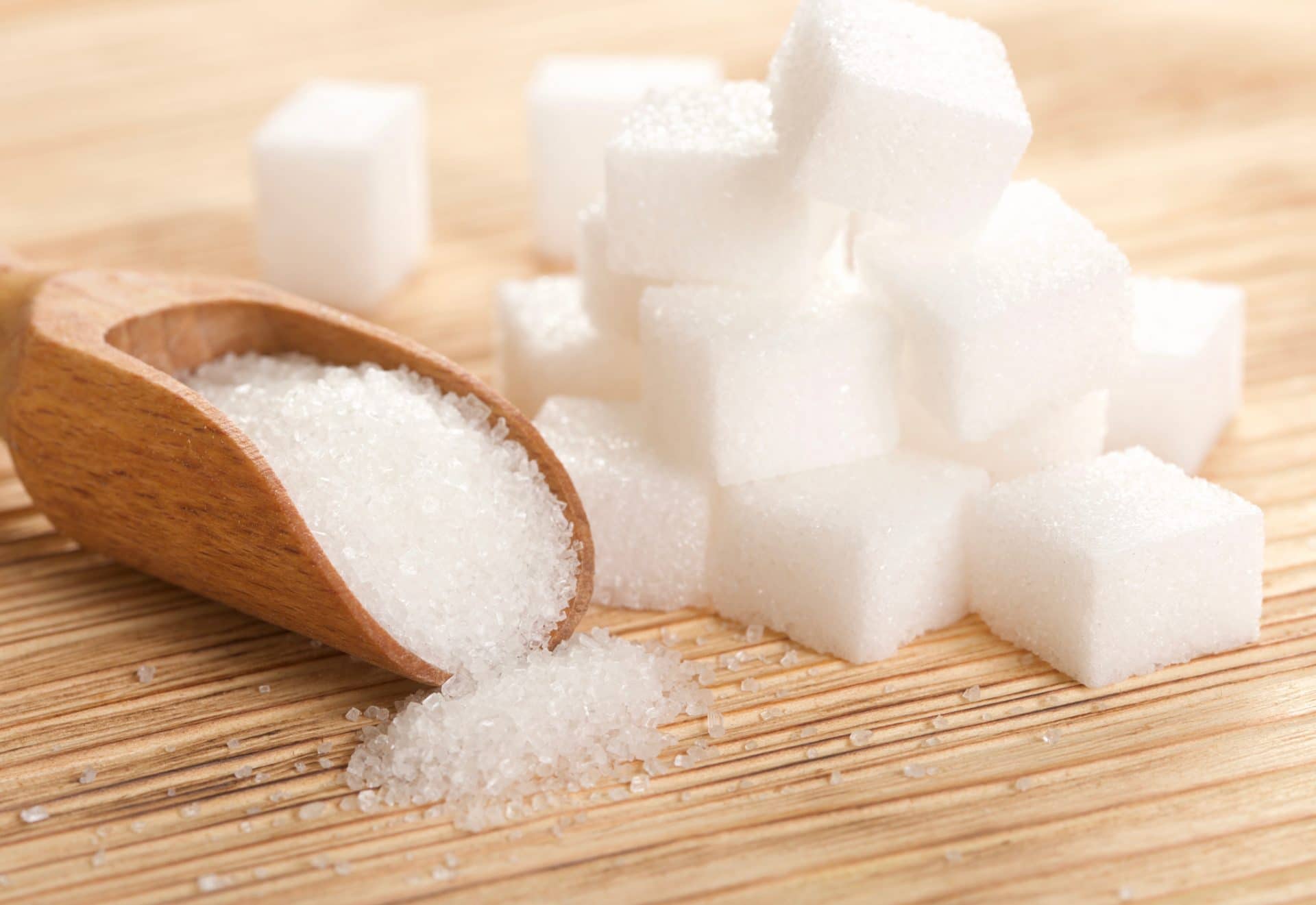We are proud to say that these posts are not sponsored. Our editorial team of Bobbie moms and writers personally select each featured product. If you buy something through our links, we may earn an affiliate commission, at no cost to you.
Corn Syrup vs. Lactose— Let’s get down to business.
“What’s the best infant formula for my baby?” It’s the question on every new parent’s lips, especially if you’re feeling guilty about even considering formula. Since sugars are in both breast milk and infant formula, they’re a good place to start exploring before making a choice. So let’s address why is there sugar in baby formula and how much sugar is in baby formula?
Much more than a sweetener, sugars are actually easy-to-digest sources of carbohydrate that help your baby to grow and thrive, and they’re especially important for growth and development in their first year of life. However, despite what some might claim, not all sugars are created equal. Not by a long shot.

The gist of sugars and baby formula
As the main source of energy for a growing baby, sugar is one of the most important components of infant formula. But, not all sugars in baby formula are the same.
Baby formula and sugar
Your baby’s body may be small but it’s smart enough to identify and react to different sugars. This means the type of sugar, which will provide approximately 40% of the calories your baby eats, is an especially important consideration when you’re choosing an infant formula.

Shop Bobbie Organic Infant Formula
Bobbie Organic Infant Formula is a USDA Organic, EU-style infant formula that meets all FDA requirements. It is a complete nutrition milk-based powder modeled after breast milk and is easy on tummies. It is non-GMO and doesn't have corn syrup, palm oil, or maltodextrin. Learn more about Bobbie.
Natural breastmilk sugar
If you’ve ever tasted breast milk, you’ll know it’s surprisingly sweet. This is thanks to a high concentration of sugar that naturally occurs in human milk, called lactose. Using lactose to provide the same sugar in standard infant formulas is a no-brainer.
Here are a few more facts about lactose and breast milk:
- It aids the absorption of calcium
- It’s a natural prebiotic that feeds the healthy bacteria in your baby’s gut
- It supports an efficient metabolism
- It’s less sweet than other carbohydrates used in infant formula.
- It must provide at least 50% of the carbohydrates (sugars) in European formula. This is not the case in US formulations.
Do you need to use Sensitive or Gentle infant formula?
What happens when your baby doesn’t seem to tolerate standard baby formula? Sensitive or Gentle formulas seem to provide the solution. Nearly all of these ‘Tolerance’ formulas don’t use lactose (or at least not fully), relying on alternatives such as corn syrup solids, maltodextrin, sucrose to name a few. The point of replacing lactose with a less desirable sugar is that if a baby is lactose intolerant they will more easily digest non-lactose sugars. However, the true incidence of lactose intolerance in infants is extremely low. Remember, even in healthy infants things like spit-up, gas, crying, fussiness, constipation happen. If you have concerns about how your baby is tolerating formula discuss with your baby’s pediatrician. If all is well, consider using a formula with only lactose as a carbohydrate source to better mimic what is found in breast milk.
Why does sugar matter for kids?
The quality and quantity of sugars consumed by infants and toddlers have been found to shape their metabolic health, food preferences and the consumption of sweet, high-energy foods later in life.
How to choose a baby formula?
Ensuring your baby’s formula is packed with beneficial ingredients will help you to maximize their digestive health, biological functioning, and contribute to their lifelong well-being.
To help parents out there make a more informed decision on sugar in their baby’s formula, we are addressing the most commonly asked questions when it comes to sugar in baby formula.
Q&A with Tiffani Ghere, a Clinical Registered Dietitian, Certified Lactation Educator, mom to three boys and Bobbie Medical Expert. She holds degrees in Food Science and Nutrition Science and is Board Certified as a Pediatric Specialist. She has worked in neonatal and pediatric critical care as well as outpatient specialty clinics for 20+ years and held key positions in industry advisory boards, a global pediatric innovation society and clinical collaboratives for infant feeding best practices. So let’s just say she knows her sh*t.

Q. There’s a lot of research on how corn syrup and sucrose impact the health of older children and adults, what do you think this means for infants?
A. Tiffani: Sugar is an acquired taste and added sugars in baby formula can train a baby’s palate to become accustomed to highly sweetened foods later in life. Selecting formulas with sugars similar to breast milk (lactose) will help set up the baby for long term health.
Q. If babies feel uncomfortable, could it be caused by lactose?
A. Tiffani: Lactose intolerance is actually quite rare in infants. If you see changes in your baby’s stooling frequency, volume, watery stools, frequent vomiting, consult your pediatrician. Lactose may not be the only consideration for this situation.
Other conditions such as cow’s milk protein allergy or infection may need to be considered. While spitting up is common in infants, an increase in frequency, volume and/or type of spit up may need to be addressed by a health professional. Consult your pediatrician to ensure you haven’t missed anything needing attention. If all checks out and baby is growing well, you may need to invest in some cute bibs and resolve to do laundry a little more frequently.
Understanding sugar in baby formula:
- Read baby formula ingredient labels: Milk should always be the first ingredient, not sugar.
- Hidden sugars: Learn other names for sugar like corn syrup, corn syrup solids, maltodextrin, sucrose.
- Never ever: Don’t use sugar, especially honey or corn syrup to treat constipation. This old wives’ tale can be unsafe for your baby.
- Sweet fix: Research indicates that it is important to expose children to a wide variety of flavors and textures, but also important not to overdo it on the sugar intake at a young age.
- Monitor tolerance: Watch how your baby responds to any new formula.
If you want to read more research about the additional of sugars into baby formula, Tiffani suggests the following sites.
The role and requirements of digestible dietary carbohydrates in infants and toddlers
The influence of children’s diet on their cognition and behavior
Early nutrition programming of long-term health
Fructose: It’s “Alcohol Without the Buzz”

Shop Bobbie Organic Infant Formula
Bobbie Organic Infant Formula is a USDA Organic, EU-style infant formula that meets all FDA requirements. It is a complete nutrition milk-based powder modeled after breast milk and is easy on tummies. It is non-GMO and doesn't have corn syrup, palm oil, or maltodextrin. Learn more about Bobbie.

